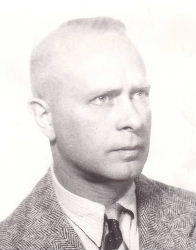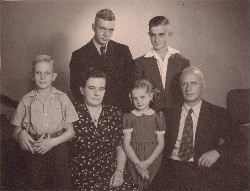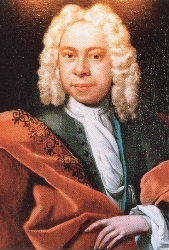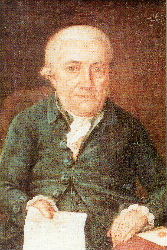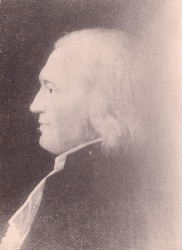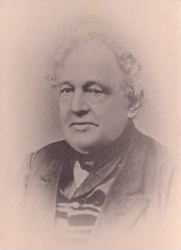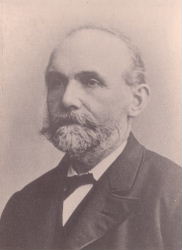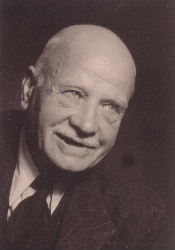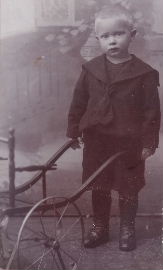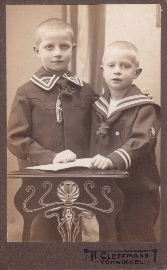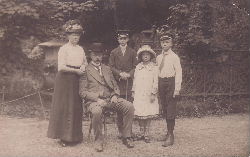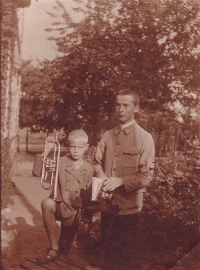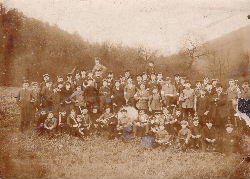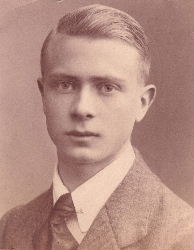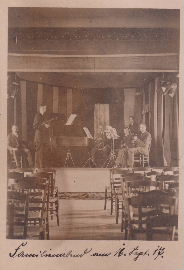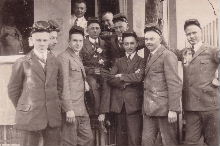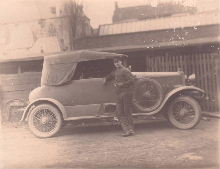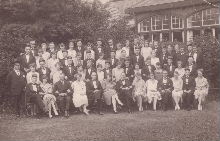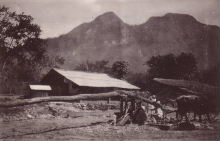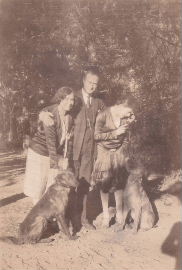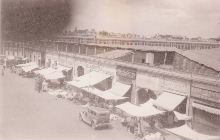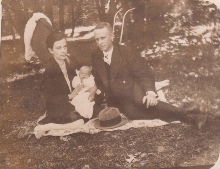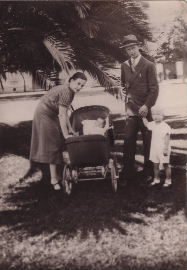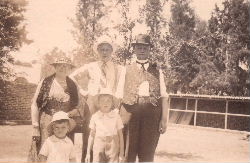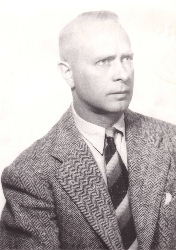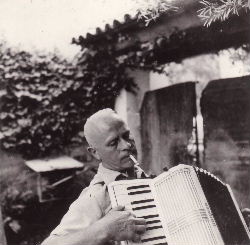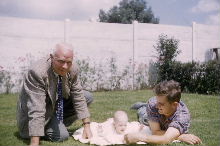|
Biography Walter Luyken
Walter was born in the farm of his father Hermann in Hemmern near Lippstadt (Germany). The farm was set afire by a servant
so the family had to move to Vohwinkel in Wuppertal where Hermann's father-in-law lived. He went to school in Wuppertal-
Elberfeld.
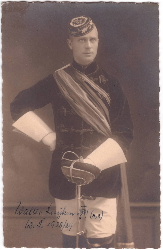 During World War I, when he still was a child, he was often raised from bed to play horn as the youngest menber in a band
that went playing through the streets when there were victory news.
During World War I, when he still was a child, he was often raised from bed to play horn as the youngest menber in a band
that went playing through the streets when there were victory news.
After school he went to Bonn to study agronomy at the university. He became member of a student corporation named Agronomia
where it was custom to fight with a sable. He later became president of the corporation and had pipes built in the meeting
room through which beer was pumped to every place at each table to avoid the nuisance of serving.
In Bonn he fell in love with his filia hospitalis, Elisabeth. During the first dinner with his hosts and later parents-in-law
he cut the plate through while trying to cut the meat. When he was asked how the meal was, he answered it was good but
could have been better and more.
Because of the difficult situation during the recession he had to give up university and worked thereon as a farmer, a
transporter and as a businessman. He founded a poultry farm which he named "Grossgeflügelhof Bergisch Land" and which he
later on leased. He selled straw for the horses that worked in the coal mines. The business relation came to beeing because
of a Luyken relative who held a high ranking position in the mine. After he couldn't find any more straw he founded together
with his cousin and civil engineer Walter Ehrenberg an engineering company. The city was one of the company's customers.
The company was engaged for building a supporting wall and the city agreed on stuffing the land behind the wall, which was
not done. The wall collapsed. The company was sued and Walter Ehrenberg emigrated to Mexico while Walter Oskar fixed the
affair. After that he also emigrated to Mexico as the economic situation in Germany was very difficult. The cousin had
written a letter saying that there was a lot of work in Mexico.
Before he emigrated to Mexico he wanted to say good-bye to Elisabeth. This was during a ball. When Walter came into the ball
room he saw that Elisabeth, a passionate dancer, was dancing with another man. Walter turned and went away. Before he left
the country he went to the barber to have his hair cut. At the barber's there was a cartoon depicting a Mexican band with
the inscription "Please do not shoot at the band, it is doing its best". The barber asked apalled if he really wanted to
emigrate to Mexico. Thereafter he went to eat some Sauerkraut and Eisbein, as he thought he wouldn't be able to eat that
soon again, not knowing that he would spend the better part of his life selling it later.
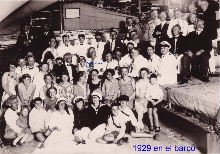 To Mexico he went 1929 by ship. He arrived at the port of Veracruz. The authorities demanded the presentation of 20 pesos gold
in order to get into the country. Nobody had that sum with him. So the money was raised among all. Each one produced the same
20 pesos as he left the ship. In Veracruz Walter met his cousin, who took him to the state of Oaxaca. The last part of the
trip had to be ridden on horse. Walter Ehrenberg worked there as a measuring engineer. While on the trip Walter Oskar
became thirsty and asked his cousin for water. He stopped at a puddle and told him to drink from it. Walter answered
horrified that even frogs would live in it. The cousin answered that as long as the frogs lived he could drink the water.
To Mexico he went 1929 by ship. He arrived at the port of Veracruz. The authorities demanded the presentation of 20 pesos gold
in order to get into the country. Nobody had that sum with him. So the money was raised among all. Each one produced the same
20 pesos as he left the ship. In Veracruz Walter met his cousin, who took him to the state of Oaxaca. The last part of the
trip had to be ridden on horse. Walter Ehrenberg worked there as a measuring engineer. While on the trip Walter Oskar
became thirsty and asked his cousin for water. He stopped at a puddle and told him to drink from it. Walter answered
horrified that even frogs would live in it. The cousin answered that as long as the frogs lived he could drink the water.
Later on Walter founded together with a hacienda owner, who brought the capital, a poultry farm in the state of Guerrero.
The business didn't catch on as there were lots of bugs. The many scorpions bit the hen dead when these tried to eat them.
The hacienda, of which the poultry farm was part of, was very remote. It could be reached only after a day's horseride.
Walter had to build a hut by his own to live there. He felt very lonely and had to think a lot of Elisabeth. So he wrote
her a letter and asked her to marry him. He promised her enough water to drink as he didn't have anything else. Following
that Elisabeth too emigrated to Mexico. They married after she arrived in Veracruz.
The young couple went then to the poultry farm, part by train, part by bus and part on horse. There there was not so much
to eat so Walter went frequently hunting. When he complained with the hacienda owner that there was not enough to eat he
was shown all the edible plants that surrounded them and he pointed at a mango tree, which they did not know. Later they
caught malaria while Elisabeth was pregnant. The farm was separated from the hacienda's main building by a river that grew
up a lot during the rainy season. Once they went out of quinine, which then was used to treat malaria. To stock up Walter
had to cross the river which almost cost him his life. Because of that they decided to move to the capital which meant a
one day's horse ride for pregnant Elisabeth.
In Mexico City Walter first worked for a German at a diary. After a short time they overtook the subsidiary of a deli
which belonged to another German and was named "Bavaria". The business was succesfully operated by both and after a while
Walter could found another poultry farm which was meant to supply the deli with eggs.
Elisabeth gave birth to five children, one of which died shortly after beeing born. As the business left very little time
for the children it was sold. The couple lived of the poultry farm and of a diary. A hacienda was also acquired where
chicks where raised until they where able to lay eggs and also was used for farming. First of all agave plants were
raised for the production of pulque (an alcoholic beverage). Pulque was the national beverage in Mexico until it was
substituted by beer.
Shortly after World War II Elisabeth and Walter chose to live appart without being divorced. After a short time the poultry
farm had to be closed because the city sprawled relentlessly. The premisses of the farm were parted and sold as land for
building. The earnings allowed Walter to retire. With time he got badly sick with arthritis which tied him increasingly to
bed. He had to use crutches and once fell so badly that he died of a cerebral bleeding. His remains were cremated and buried
according to his own will in Wuppertal-Vohwinkel (Germany) in the tomb of his parents.
|
